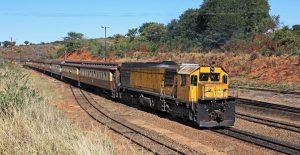

THE collapse of Zimbabwe’s rail system has exposed the country’s base minerals to rampant smuggling through porous borders, depriving the economy of foreign exchange, a new report shows.
The National Railways of Zimbabwe (NRZ) was a key carrier of base metals into the port of Maputo, remitting hundreds of millions of US dollars to the Treasury each year. However, due to the collapse of its rail network and antiquated technology, the rail company is losing revenue to haulage vehicles.
The privatisation of the transportation of state-owned resources by road has opened up a massive window of opportunism resulting in massive smuggling into neighbouring countries, according to a report by the parliamentary portfolio committee on defence.
According to the report, the Minerals Marketing Corporation of Zimbabwe (MMCZ) indicated that the haulage of bulk base metals by road has led to Zimbabwe losing its mineral commodity.

Zimbabwe sits strategically on the north-south corridor connecting the copper mines in Zambia, mining exploitation in the Democratic Republic of Congo, Botswana, Mozambique, and South Africa as well.
The report, titled The Security of Minerals: Illicit Trading in Minerals and Mineral Leakages, said a truck with a consignment of 130 tonnes of chrome was impounded and the suspects attempted to smuggle the mineral using fake export documents purportedly issued by MMCZ.
 The Statutory Instrument on base minerals export control says no raw base mineral ores shall be exported from Zimbabwe to another country except under written permission of the minister given in either written application to him by any miner or other interested person.
The Statutory Instrument on base minerals export control says no raw base mineral ores shall be exported from Zimbabwe to another country except under written permission of the minister given in either written application to him by any miner or other interested person.
The raw base mineral ore order states that in circumstances where the ore cannot be processed locally and warrant exportation for processing, production of proof satisfactory supporting the need would be required.
“The export of any unbeneficiated base mineral ore in respect of which the applicant produces compelling reasons to the minister showing that no such ore is capable of being beneficiated to any extent within Zimbabwe or the export of samples of any unbeneficiated base mineral ore for assaying outside Zimbabwe, upon production of proof satisfactory to the minister that such assay cannot be satisfactorily done in Zimbabwe, and that the quantity to be exported for that purpose is necessary for that purpose,” reads the gazetted rules.
Base metals include lithium, nickel, chromium, manganese and tantalite.
In 2022, base metal prices were largely supported by the reopening of the Chinese economy from Covid-19-induced lockdown.
In the outlook for 2023, the Chamber said the anticipated sluggish global growth and the attendant demand for base metals are expected to support high prices.
Chrome is one of the major minerals in global demand and is being mined in various parts of the country by both large-scale and small-scale producers.
Zimbabwe boasts the world’s second-largest chrome reserves, behind South Africa, and most of this mining occurs along the Great Dyke.
According to the Chamber of Mines of Zimbabwe, chrome ore production at 1,1 million tonnes for 2022 was 11 percent down compared to 1,2 million tonnes in 2021.
In the outlook for 2023, chrome output is expected at 1,5 million tonnes buoyed by producers ramping up production.
Nickel production in 2022 at 14 259 tonnes, declined by eight percent compared to 15 439 tonnes recorded in 2021 due to production stoppages at the primary producer.
Lithium output increased from 30 502 tonnes in 2021 to 86 225 in 2022. The growing global push towards electric vehicles has seen significant capital injections in the Zimbabwe lithium space.
newsdesk@fingaz.co.zw